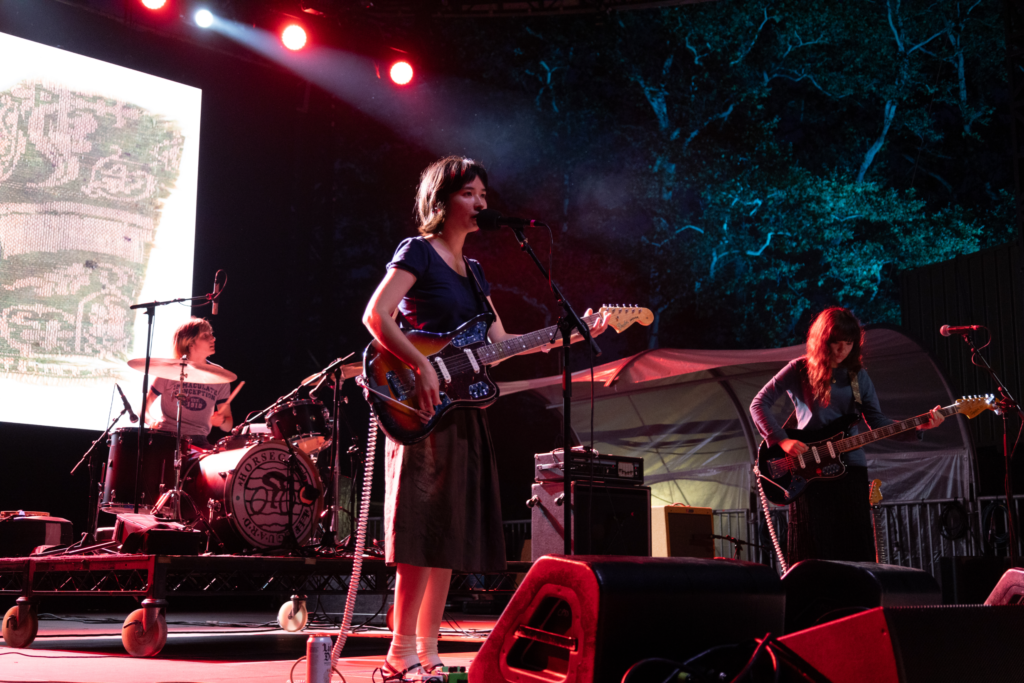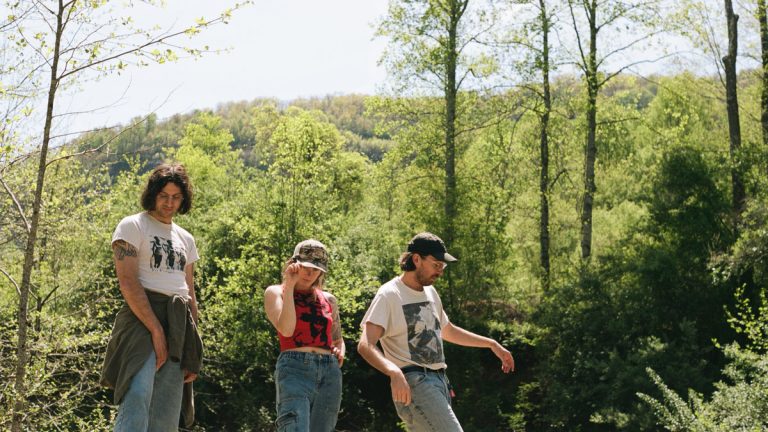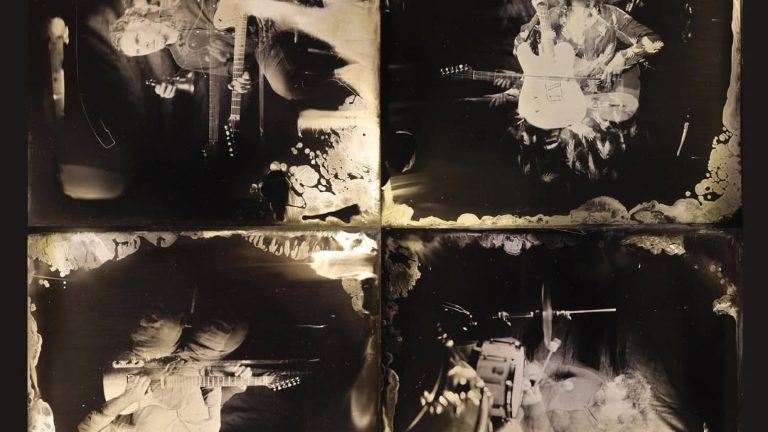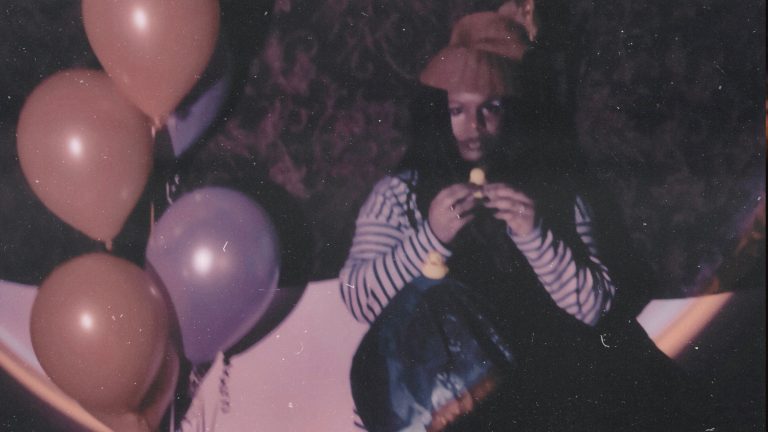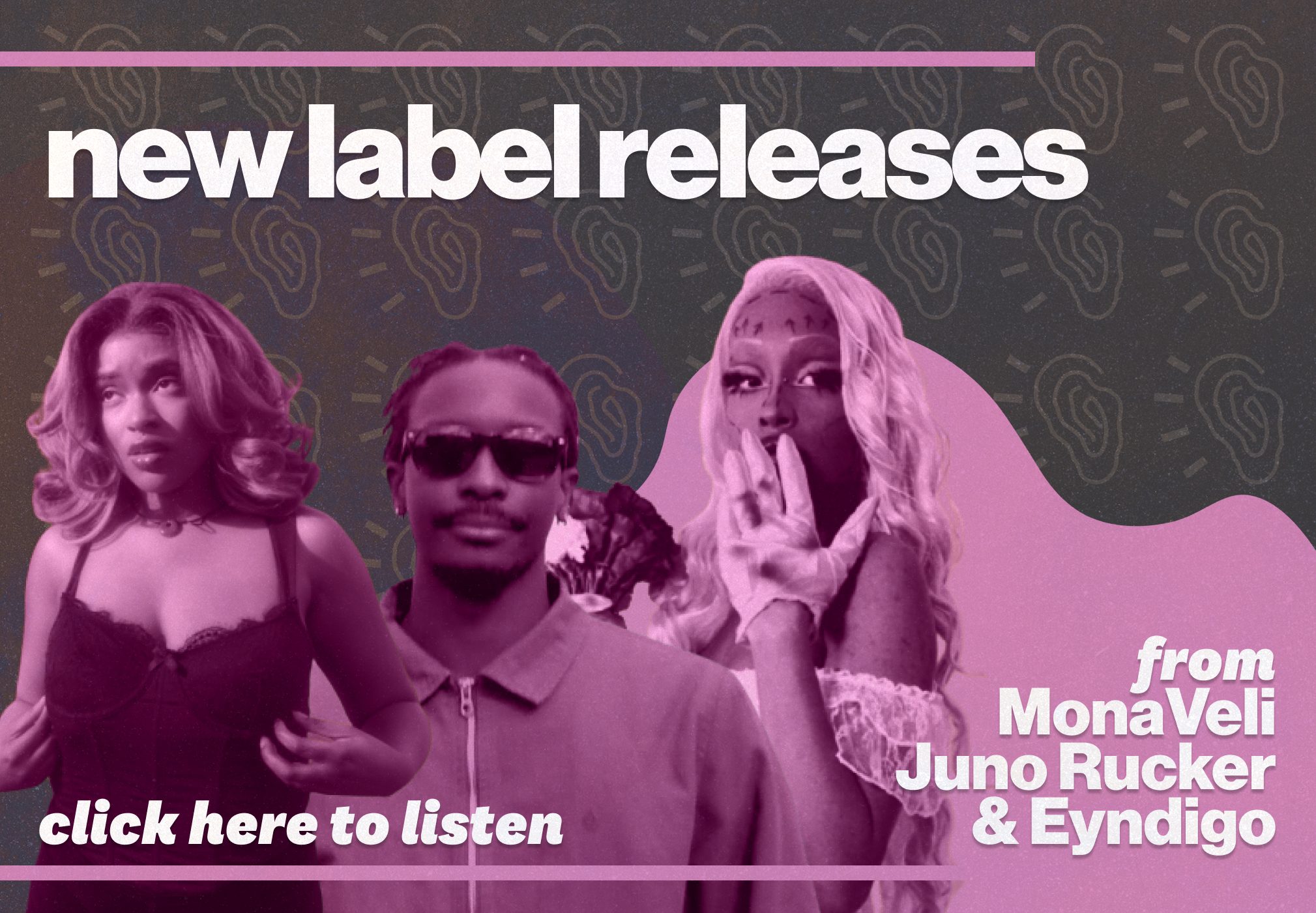Note from the editor: In the Crowd is a new concert review series on the EveryDejaVu blog. Concerts tell a story and showcase talent just as much as albums, and these reviews will bring you to those moments just as if you were “in the crowd.” Big shout out to Layla Passman for being the one to kick it off with a review on this special event put on by Matador Records in New York City. We’re looking for more writers who would like to do these sorts of reviews, specifically in the Boston and New York City areas. Please email me if you’re interested at ryan@everydejavu.com.
Photos by Shelby Kraut.
A summer evening happens to be the perfect time to see exactly where your New York City tax dollars are going. I walk on AstroTurf in the middle of the largest park in the city, framed by branded bleacher seats, proudly promoting the Capital One City Parks SummerStage. Matador Records, one of the largest indie labels around, held court that night, displaying four bands on their label. In the bleachers outlining the stage, I sat and was questioned about my allegiance to 90s rock by someone holding an old-time smoking pipe with no tobacco in it. I found this equally odd and distracting, having to push them away with my eyes in order to catch the first band.
I came in the middle of the Lifeguard set, as they were putting themselves to rest in a nap of feedback. Three shaggy-haired, skinny-jeaned teenagers had their backs to the stage, entranced in their own noise. Just as I thought the song was ending, they rolled into another heart-pounding beat, as two little girls licked their melting ice cream cones in the foreground. They continued to play, and one of the members of Horsegirl shot Capital One SummerStage branded t-shirts out of a cannon. They played siren songs you also feel like dancing to, though most of the crowd gave them approving nods or blank stares. The boys took their guitars off while the feedback still rang—I barely noticed they had left the stage.
I realized my press credentials gave me access to the Captial One SummerStage VIP section, complete with cushioned fold-out seats below the scaffolded roof, protecting me from the beautiful summer evening warmth. Under no announcement or grand entrance, Water From Your Eyes started to play. Rachel Brown, one half of the group, wore a sheer magenta top that made their small figure visible from the highest towers. Water From Your Eyes is brutal on the ears at first, using atonal, glitchy synth sounds that first make you want to shy away. But then they pull you in for a dance. It’s a head-thrashing, loose-armed beat that nobody in the audience takes cues from. The hesitation in Brown’s voice almost harmonized with the noise of the synthesizer. During a pause, Brown exclaims that “indie rock is in the house tonightl” a meek contrast to the cutting sound emanating through the faux lawn. The set continued on with simultaneous doom and playfulness, stopping for the occasional crowd work. Brown noted the number of faces in the audience, giving reason to look down as they perform. While abrupt in nature, the songs keep climbing through the music, like untangling a knotted necklace. I enjoyed watching the backs of people’s heads move, seeing them move through the crowd by the only part of themselves they cannot see. Brown paused again and commented that the summer heat caused by climate change is a bummer, as is half of life. But the other half, they said, can be nice, like being here with all of us. A more symphonic, layered track eased in as they spoke, and a member of Lifeguard became the heir to the t-shirt cannon.

Shortly after, members of Iceage assumed their positions, all but frontman Elias Ronnenfelt. The band began to play over a sample of flapping helicopter wings, and Ronnenfelt swooped in seconds before he was scheduled to sing. Ronnenfelt remains a glimmer of a nearly-extinct rock stardom. Always a little drunk, greasy, and sexy, ready to exert his raspy vocals, because its imperfections are what draws listeners in. This allure, I think, can only be achieved presently by Europeans. Americans try too hard, but the Danish-born Ronnenfelt knows how not to give away too much of your desires. He sprayed his beer bottle into the crowd as he walked on, gripping the mic stand like he is about to be dragged into the depths of hell by a demon, clinging for dear life.

Their music is classically sleazy and gritty, but widely listenable and easily likable. Elias lets out an earnest “What’s up America,” a reminder that he is a foreigner in the too-familiar state of indie rock. Listeners move their fists to the marching beat of the set, and I fear that their arms will detach from their sockets. Iceage snuck a cover of “Pull Up” by Abra into the set, something that only my photographer Shelby could catch. The bass player barely moved his bowl-cut adorned head while playing, just sunglasses and a straight face. Each song has a moment of suspension, usually held by generated sounds coming from beyond the band, like cars screeching, only for Ronnenfelt to throw his whole body onto the microphone. Eventually, he sits down on the stage in defeat and gives out a fatigued wail. It’s like Iceage cans smell the desperation of post-punk hopefuls, and keep hold of their own corner in defensive pride. Elias suddenly had a harmonica in his hand, adding another element to the band’s already charming grit. I saw one of the guitarists make a heart with his hands before the band walked off the stage, delivering a performance both earnest and grimey.
The sun had set now, and I decided to make friends with the fake grass and sit for Horsegirl, the final set of the night. I have always felt a special warmth, if not age-envy from Horsegirl. Being an alumna of the same school as the guitarist, and taking lessons from the same music school in the city, I feel like I know them. I know the experiences they have had and the environment that has inspired them, and at the same time, I realize how much older I am than them, and how they were able to capture this state years before I ever came close.
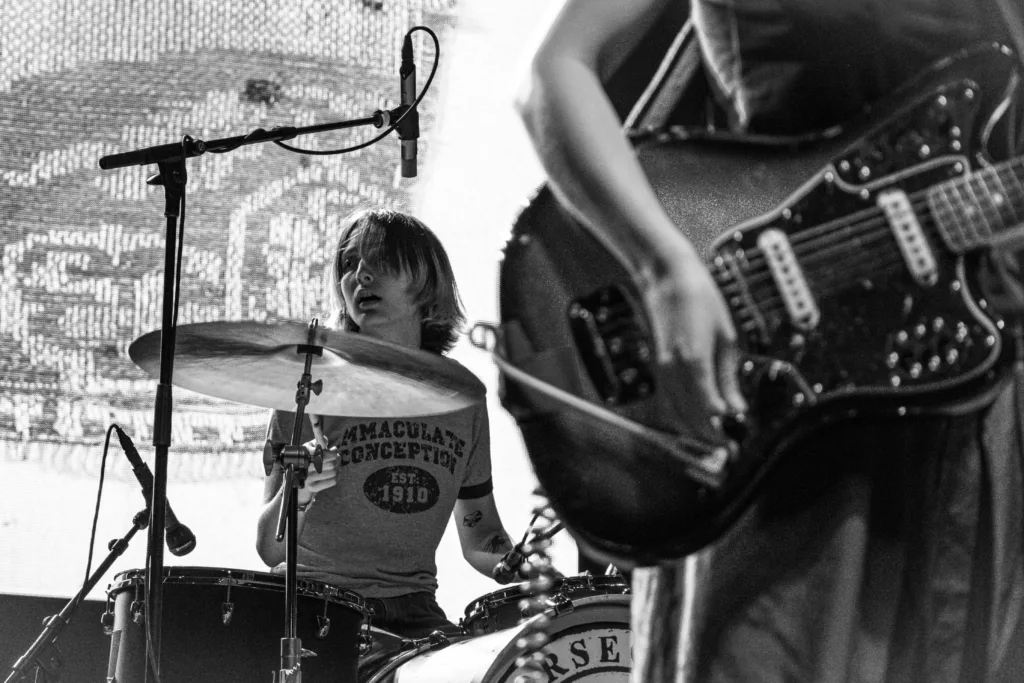
When they began, I stood up from the turf and inched closer. They started slow and fuzzy, playing their most popular songs within the first 15 minutes. They wanted to get them out of the way, to make room to experiment for the latter half of the performance. It started out blurry, unsure of where the beat would take me. Slowly, the five-string bass and guitar would fold into the drums, creating a seamless tapestry of sound that still felt like Chicago in the fall. They add quaint dos and das to their otherwise sparse lyrical ground. I began to feel washed away by their entangled approach to the set. There is a certain romance to it, no matter how disjointed or daring the songs may feel.
By this point, Horsegirl was in a total flow state. It was hard to distinguish where one song began and another ended. I began to melt into the AstroTurf and stopped following each song and instead, enjoyed watching them play. I thought about how they grew up together, showing each other music as teenagers and playing in the neighborhoods I know and love. From the corner, I see Water From Your Eyes at the helm of the t-shirt cannon. I saw the piece of balled-up fabric fly above me, and land near the seats I was in prior. For the last song, Lifeguard, whose guitarist is the little brother or Horsegirl’s guitarist, joined them on stage with maracas, and tambourines. I wondered how the bands have influenced each other over the years of overlapping practices, shows, and parents. By the end of the set, their already infrequent singing had faded away, and we were just left with the winding drum beats and nostalgically earnest melodies. I sat down again, and the AstroTurf felt a little softer.

